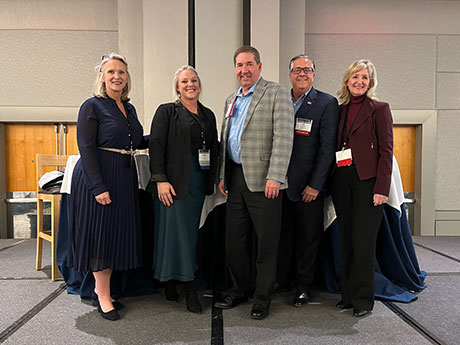
ATLANTA — Shortened attention spans and the desire for instant gratification are a couple of the changing consumer behaviors that impact the multifamily operations industry. Karen Key, a president with Houston-based Asset Living, said that 75 percent of consumers expect a response time in less than 24 hours from a business. Twenty percent expect a response time within minutes.
“If you’re missing that mark and someone else is responding to them, whether it’s a client, prospect or resident, you’ve lost them. They’re gone.”
Key’s remarks came during the operations panel at the 2023 InterFace Multifamily Southeast conference, which took place Thursday, Nov. 30 in Atlanta. France Media and Southeast Real Estate Business hosted the event at the Westin Buckhead hotel. Ed Wolff, president of California-based LeaseLock, moderated the panel, which was entitled “What’s Changed and What’s Not Changed in Terms of Occupancy, Rental Rates and Operations?”
Key emphasized that many of these changes resulted from the COVID-19 pandemic. “When the pandemic happened, everyone got spoiled in terms of having everything at their fingertips. They were tied to a computer all day every day,” she said.
As such, Asset Living’s use of social media as an advertising tool increased significantly ever since COVID. “Everything we’re doing today is to drive the customer experience and make it better while also trying to find efficiencies,” she said. “We had to start marketing differently. What we did 10 years ago doesn’t work today.”
Sherry Freitas, executive managing director of property management for Atlanta-based RangeWater Real Estate, said that apartment operators are competing against a resident or prospect’s “last best experience.” In other words, renters are comparing the response times they receive from various apartment operators. This example demonstrates the significance of having reliable technology.
“It’s important to make sure all of our technology works seamlessly from start to finish and that there are no gaps. The second that there’s a gap and the user gets frustrated, they’re gone,” said Freitas.
Walt Lamperski, president with Atlanta-based Stonemark, went so far as to say that if people don’t get a response within seconds, they will think something is wrong.
This consumer behavior is not only a factor in gaining new tenants, but it is also impacting the way apartment managers train their staff.
“We can’t expect our team members to sit in front of a computer for an hour to take a class — not only because they don’t have the attention span but because they’re busy,” said Freitas. “We have to think about how we get little nuggets of training to them quickly and on their terms so that they can absorb it.”
Occupancies are stable, but getting new leases takes work
Inflation and rising interest rates have put a strain on consumers’ wallets. Nationally, Americans are facing the worst housing affordability crisis since 2006, according to Teresa DeVos, senior managing director with Florida-based DLP Capital. “That influences our ability to maintain occupancy at multifamily communities,” she said.
According to DeVos, DLP has experienced fairly stable occupancies this year, but has had to work harder to get leases. The firm is focused on providing attainably priced housing in secondary and tertiary markets, which DeVos said helps keep occupancies high. DLP’s stabilized properties average 90 percent occupancy.
Asset Living manages about 250,000 units in over 40 states. Key said that every market’s occupancy has dropped about 4 to 5 percent over the past year. But she made a caveat: Many markets were operating at 98 percent occupancy in recent years.
“We keep talking about these softening markets, and I’m not saying that that’s not happening, but it’s almost like they’re rightsizing right now,” she said. “The majority of our deals are sitting at 93 to 95 percent occupancy, but that’s where we were happy five years ago. We used to be ecstatic if we got to 95 percent.”
Key also stated that the number of leases hasn’t changed too much year over year, but the amount of work going into signing those leases has shifted significantly. The panel agreed that staff training is an issue in getting deals closed.
“It’s not that they are uncaring or lazy, they just really don’t know,” said Lamperski.
Stonemark has significantly ramped up its leasing training, doing about triple the amount of training that it did a year ago, according to Lamperski. All calls are now recorded, and the leasing agents listen back to their own calls and then report to the manager about how they think they performed.
With hard work comes reward. Stonemark provides multiple types of bonuses for its employees, including everyone from groundskeepers and community managers to senior leaders.
“There’s a shortage of quality staff,” said Lamperski. “To me, if you treat those top performers like the superstars that they are, you will be rewarded 10 times over.”
RangeWater is also in the process of rolling out a new bonus program for its employees based on key performance indicators. Factors include reputation management scores, financial performance, work order quality and close-out.
— Kristin Harlow
"interface" - Google News
December 15, 2023 at 08:30PM
https://ift.tt/Nx0J5XI
Multifamily Operators Had to Work Smarter, Harder This Year, Say InterFace Panelists - REBusinessOnline
"interface" - Google News
https://ift.tt/VAYk29h
https://ift.tt/lNjeTBF
Bagikan Berita Ini














0 Response to "Multifamily Operators Had to Work Smarter, Harder This Year, Say InterFace Panelists - REBusinessOnline"
Post a Comment